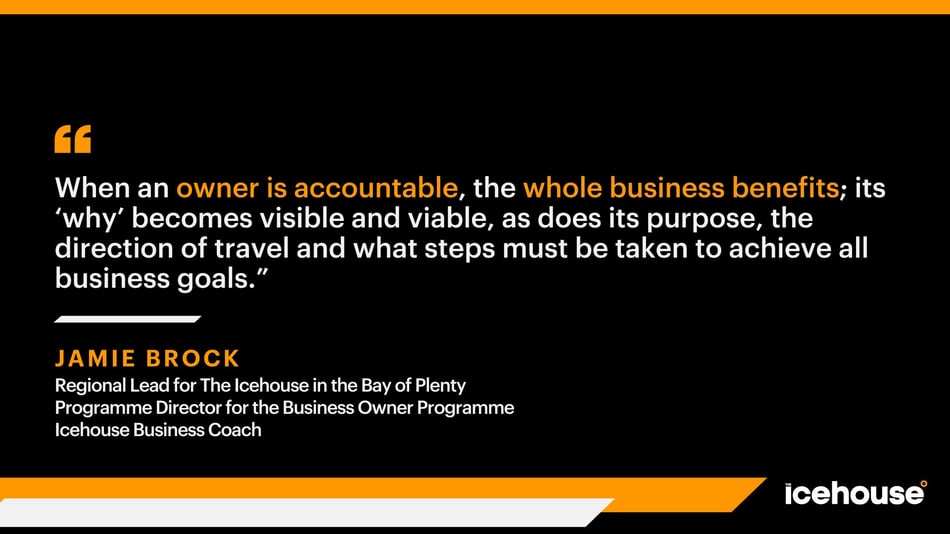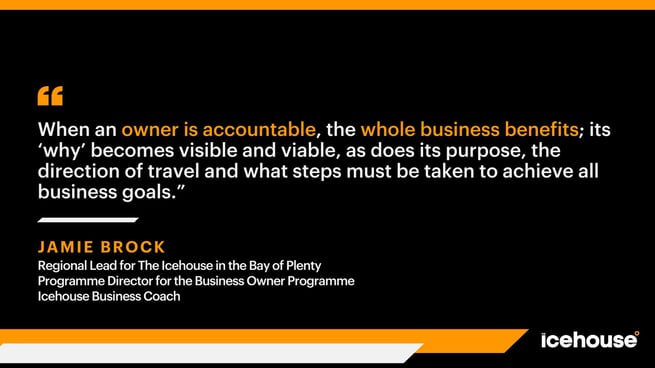Being Held Accountable: Volume 2

What can accountability do for you, your business and the people within your organisation?
Ask an owner what makes them successful, and you’ll be surprised how many respond with, ‘I hold myself accountable.’ That’s because being held accountable is a treasured business asset, a winning learned and developed characteristic. Furthermore, getting into 'the accountability habit' can positively affect a business from the top to the bottom and be the difference between surviving or thriving.

Accountability means something different to every business owner. Generally, it can begin by creating a visual plan of how the organisation should operate, listing goals, understanding the part everyone plays in making that plan work, and then assigning roles to drive through those goals.
It's then about sticking to the plan. Studies show that amazing things happen once you have an accountability culture, including increased productivity, improved customer and employee engagement, and more effective results-led strategic decision-making.
Sounds great, but the ‘sticking to the plan’ part is problematic because it begins with the owner. They might not see the value in accountability or know where to get it from. And who keeps them on track?
For our alumni, it's often been nurtured through programmes and workshops or with the help of an expert business coach. In a coaching environment, ‘accountability’ may not even come up in the first few conversations, but it will soon become apparent that a lack of accountability can explain why it's hard to solve a particular business challenge or be the reason why the business isn't going as well as it should.
Brendon O'Connor, owner of O'Connor Agri, a Financial Skills Workshop attendee and Icehouse Coaching alumni, cites accountability as the reason for the business’s recent success. “It's just accountability really, and putting things down on paper, which I wasn't very good at… little things we had to tick off that we were probably procrastinating on. [Now] we have a plan of where we want to be, and we're working on a five-year plan.”
“[And] just projecting down to the future, when you're struggling along on a monthly basis, it is hard to look that far ahead,” adds co-owner Narelle O'Connor.
“When you work in a business, you can run your decisions by someone else, have your thinking checked and get motivation when you need it,” says Jamie Brock, Regional Lead for The Icehouse in the Bay of Plenty, Programme Director for the Business Owner Programme, and one of The Icehouse's most sought-after business coaches.
“The owner doesn't always have this, so accountability may have to come from somewhere else. With an action plan, for example, the owner knows that a coach is going to challenge them on what was discussed previously. ‘Have you advertised for that new role?’ ‘How's that team morale initiative going?’
“Often, I'll receive an email the night before our next meeting, stating, ‘Here's my plan in advance of meeting tomorrow.’ Why did they do that? Because they knew I was going to ask them! That's how I hold people accountable. They're developing that accountability mindset, which will set them up well for the future.”
It’s not just the owner who benefits. An astonishing 93% of employees need help understanding what their organisation is trying to accomplish and how it aligns with their work, while 85% of leaders don't define what their teams should be working on (Anne Loehr research). As Jamie explains, the reason for all this confusion may be a lack of accountability at the top.
“Most business owners I work with, if you talk to their teams, their teams are not clear on what success for them and the business looks like, at any level. Many struggle to articulate that,” says Jamie.
“You need to have those conversations around what success looks like, whether it's customer satisfaction, employee engagement or whatever and holding owners accountable to that. When an owner is accountable, the whole business benefits; its ‘why’ becomes visible and viable, as does its purpose, the direction of travel and what steps must be taken to achieve all business goals.”
As stated before, ‘when the owner has their long-term priorities in place and a visible list of actions which are time-lined and accountable, it's easier to measure those gains and that in turn builds confidence and momentum’. Best of all, it permeates through an entire organisation.
“In terms of the business side, I'm more considered and disciplined now,” says Alex Haden, Managing Director of Preston Rowe Paterson and an Owner Manager Programme (OMP) alumni. “We know the numbers – before OMP, we didn't, quite frankly… now we're more budget-focused, budgeting out two and three years plus, and knowing what it takes to reach our objectives.
“There's accountability that comes from that. We can get engagement with our team – ‘here's where our budgets are sitting’, get buy-in, and then share that information. There's pressure that comes from it in some ways, too, but equally, there's such a good feeling of satisfaction when you achieve what you set out to do.”
For information on programmes, workshops and business coaching services from The Icehouse, click here.
For more business ownership and leadership advice, check out more of our resources.
Icehouse Alumni? For exclusive content on Icehouse Central, register now.


